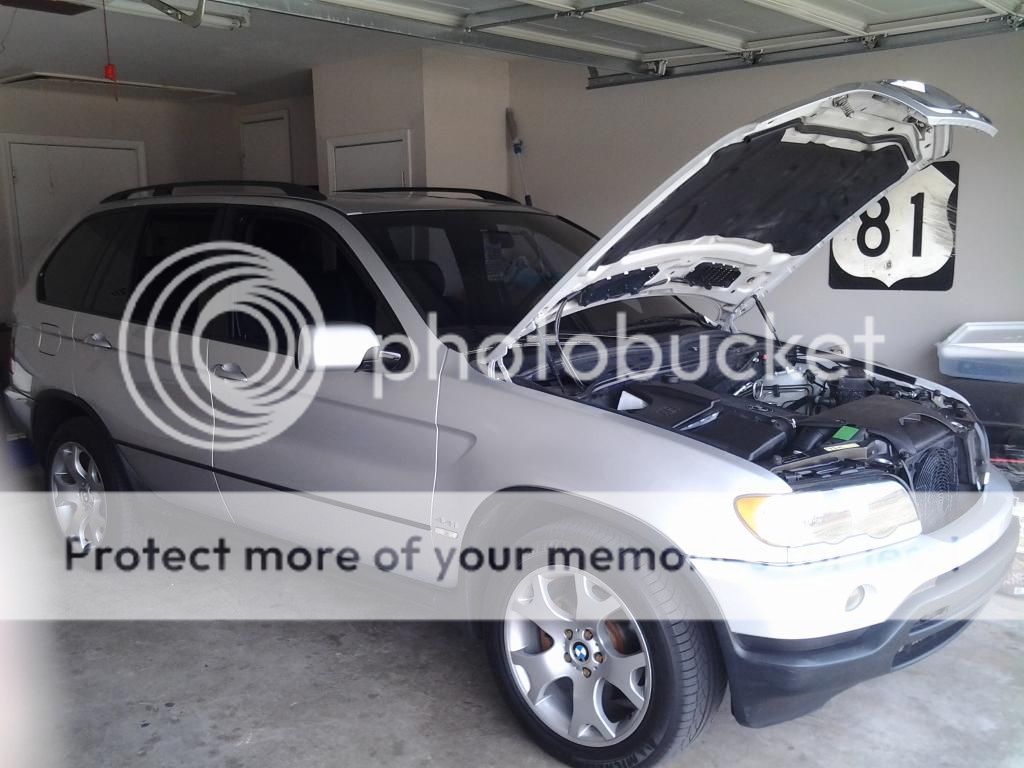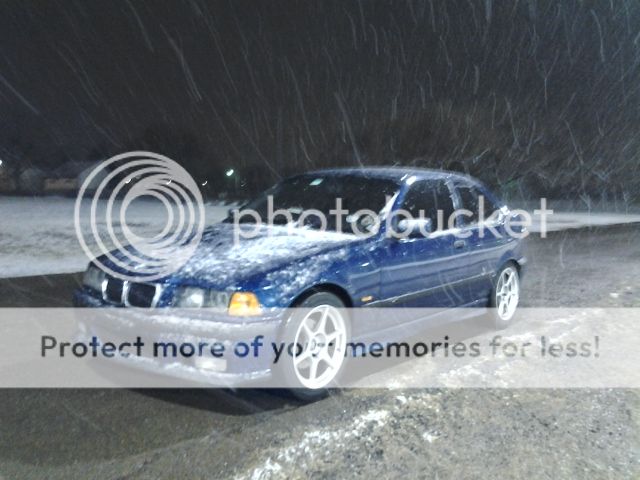|
||||||||
| Xoutpost server transfer and maintenance is occurring.... |
| Xoutpost is currently undergoing a planned server migration.... stay tuned for new developments.... sincerely, the management |
 |
|
|
LinkBack | Thread Tools | Display Modes |
|
|
|
#1
|
|||
|
|||
|
Proud new x5 owner! 2001 - 4.4i
Just thought I'd introduce myself, I've been researching the X5's for quite a while. Found a model I liked, then waited for a low mileage/reasonably priced one to pop up.
Low and behold, day before yesterday I found the one locally! Carfax'd it, inspected it, Drove it, loved it, bought it. 2001 Silver, 19" wheels, blk interior, 4.4 Sport pkg & Navigation. Only 65k miles! I'm not new to the BMW realm (also have a swapped ti), however I am new to the BMW V8/Auto Trans.. Right off the bat, I have two questions which I couldn't find any definitive information on through searching. -The swap from mkIII to mkIV navigation, is just a matter of buying the DVD unit, and following procedure outlined on bimmernav to "Plug and Play" the unit? End of story? Seems too easy.. -Flushing the Auto-Trans fluid.. I know that BMW cars historically have weak auto transmissions.. at 65k is it too late for me to worry about? (My mom's 06 x5 3.0 is at ~50k.. perhaps a good time to flush hers too?) Thanks guys! I look forward to countless hours of reading through these forums, haha. [IMG]  [/IMG] [/IMG]  The School parking posse   Here is the other toy too, in case anyone was curious  
Last edited by CHE53; 03-29-2013 at 03:59 PM. |
|
#2
|
||||
|
||||
|
Congrats and
 Do NOT flush the tranny. Do a drain and re-fill twice with filter changed, 1k miles apart. Find out what tranny you have and use correct ATF.
__________________
 00 E39 DINAN S1 //M5 (82k miles) 06 E53 DINAN 4.8iS, born 2/18/2006 (126k miles) http://www.xoutpost.com/bmw-sav-foru...s-my-dslr.html 90 Straman Z32 TwinTurbo Convertible, (1 of 44 ever made) 5 speed, 444rwhp/451rwtq 01 360 Novitec Spider F1 (26k miles) |
|
#3
|
|||
|
|||
|
Quote:
Quote:
But yeah I think I'll follow what TMV said for the tranny then. Thanks! Quote:
 Good to hear this method worked for you even after 100k miles though! gotta love that! Nobody want to spend all that $$$ on a rebuild that may or may not last.. |
|
#4
|
||||
|
||||
|
Hey Welcome and congrats !! Here is a link for your sat nav dvd update
2013 BMW Navigation DVD High Version Map Update East Disc Replaces 2012 BMW | eBay
__________________
2006 X5 4.4i premium, Sport package ,Winter Package, Sat Nav. AFE Power stage II Production : 08-2006 2012 BMW 128I Convertible Black 2011 Mercedes Benz B200 sold |
|
#5
|
|||
|
|||
|
Quote:
Quote:
Quote:
I've done some more reading on the subject, and it appears that often times transmission fluid lubricity isn't incredibly affected by time (like you said), as it is heat. If the transmission was ever run at excessive temperature the ATF will degrade at an exponential rate, because it is outside of the specific ATF design parameters. -With degraded ATF comes slipping/more overheating (IIRC) -Also, a possible sign of overheat would be discoloration of the ATF (though other things may cause this too? May not be a dependable method..) I definitely agree with you though.. There isn't one correct answer, with the exception of a known-overheated transmission, it seems like a roll of the dice either way. (being a used car and all) |
|
#6
|
||||
|
||||
|
Quote:
The additives are also there to provide thermal stability. If the fluid is overheated (abuse, slipping clutches, etc) then it will break down, and the additives won't function as designed. Overheated fluid changes colour, and smells burnt. If the fluid isn't burnt, I would say the chances are the additives are still good. There are transmissions that have run hundreds of thousands of miles on the original fluid, so it isn't like the fluid has a sell-by date. It can last fine, as long as it isn't overheated. There are also additives in there to modify the friction characteristics of the fluid, right at the point of clutch engagement. Those are what are different from fluid spec to fluid spec (Dexron, Mercon, ZF Lifeguard 5, Lifeguard 6, etc). All the fluids are essentially a 10w hydraulic oil, with different additives. The clutches in any particular transmission design expect a certain fluid frictional characteristic and are tuned to that spec. Using a different fluid is a common way to fail a transmission, if they slip too much (now you get overheating, see above). If they don't slip enough, you get grabbing, and things break. Equally bad. There is no way to test the fluid for those additives remaining, this isn't like a viscosity test. If the transmission is shifting well, that is a good indication of the fluid being in spec in this respect. If it isn't shifting well, then you can go ahead and replace the fluid and see if that helps. It may. It may not. Depends on the actual problem. But it is a cheap first attempt before pulling a transmission. Back to the fluid change philosophy, though: if it is shifting fine, then these characteristics of the fluid are likely fine. Then there is the viscosity of the fluid. It doesn't much matter, IMO, not like engine oil. Dexron III went to Dexron VI, with a signficant change in viscosity, and was backwards compatible. The transmissions that use that fluid spec don't care much. But, older fluid tends to be thicker (due to worn clutch material, which is non-metallic, but a thickening agent in practice). Putting in new (thinner) fluid, although returning to the right viscosity spec, means that things that didn't leak pressure (internal seals, not gaskets to the outside) may not hold. That can be another failure mode with a fluid change. No guarantee that it will happen, but it has happened before. Finally, there is lubrication. This is the reason that many claim they want to change their fluid, to make sure everything is well lubricated. That sounds good in theory, but the first thing to remember is that oil (of which transmission fluid is a type) never loses its slipperyness. It gets contaminated, but it never stops being slippery. Even when it breaks down due to heat. The thing to remember is that transmission fluid has several functions. It is a cooling medium, it carries heat to the heat exchanger (and the other way, during warm up). It is a hydraulic fluid that can not be compressible, ie it has to transmit pressure from actuators, turbine blades in the torque converter, etc. And finally, it is a lubricant. Of all of those purposes, the lubricating is actually the least important. Transmissions fail due to heat. They function due to hydraulic actuators and pressures. But as to lubrication, that is the lowest demand put on a transmission fluid. That is why viscosity doesn't matter much. It is why a straight 10w oil works fine. It just doesn't see the same bearing loads, shear, etc, that engine bearings see. Yet lubrication properties are the thing fluid manufacturers talk about. They use the word synthetic as if it matters at all. It just doesn't. Stability over time does. Additives do. Resistance to oxidation does. But how slippery it is is way down the list. That is why a transmission can run 200,000 miles on the same fluid, and why comparisons to engine oil ("no oil is lifetime") are not as relevant when discussing transmission fluid. Probably more than you wanted to know about transmission fluid. Again, there is no one answer as to whether to change it or not. If changed regularly, ie every 30,000 miles or so, there is low risk of a fluid change causing a problem. If changed at higher mileage, or after many years (regardless of mileage) then there is more risk of a fluid change causing a problem. And in all of those examples, at whatever mileage, you have to decide whether the benefit of new fluid is high enough to warrant the cost of a change, or if you do it right, multiple changes. Analogies to coolant, brake fluid, engine oil, etc, all of which benefit from regular changes, are not as relevant here. If you do change it, only use an OE BMW filter (or a ZF part number), never a generic one. And only use ZF fluid in your case, or a fluid that is certified to meet the ZF standard, not one that says it is "suitable for applications that call for ..." and definitely not a univeral fluid that claims to be good for all transmissions, things like D4. They may work fine. But the odds are lower. And with transmission fluid changes, it is all about playing the odds.
__________________
2007 X3 3.0si, 6 MT, Premium, White Retired: 2008 535i, 6 MT, M Sport, Premium, Space Grey 2003 X5 3.0 Steptronic, Premium, Titanium Silver 2002 325xi 5 MT, Steel Grey 2004 Z4 3.0 Premium, Sport, SMG, Maldives Blue |
|
#7
|
||||
|
||||
|
Quote:
It isn't a material (fluid) science question. It is a system question. There is no debate that new fluid is "better" in an absolute sense. The two points of debate are (1) whether installing that high-detergent new fluid in an aged system that is contaminated from normal use will result in the detergents loosening and shifting the contaminants, thus causing a blockage in the valve body and subsequent failure, and (2) whether the fluid condition is the cause of transmission failures, early or otherwise, ie before the transmission would have had a non-fluid-related failure in any case. In the case of (2), the other approach is to put aside the money you would have spent on original Lifeguard fluid and save it for when a sensor or other item fails in the transmission. It may sound like it, but this approach isn't fatalistic. It is driven by the desire to reduce the total cost of ownership. There isn't one correct answer. Preventative maintenance is a good thing. But maintenance that isn't preventative is just sunk cost. After 12 years in that transmission, if it was shifting fine, I would leave it alone, as I don't think the mileage is as much of an issue as the time.
__________________
2007 X3 3.0si, 6 MT, Premium, White Retired: 2008 535i, 6 MT, M Sport, Premium, Space Grey 2003 X5 3.0 Steptronic, Premium, Titanium Silver 2002 325xi 5 MT, Steel Grey 2004 Z4 3.0 Premium, Sport, SMG, Maldives Blue Last edited by JCL; 03-28-2013 at 11:08 PM. |
|
#8
|
||||
|
||||
|
congrats on the find!!!
 MK3 ---> MK4... remove MK3... connect MK4... done... update MK4 software to the latest with perspective view if not updated already... tranny... do as TMV said... it is not just the mileage, it is also the age... i would not touch it... |
|
#9
|
|||
|
|||
|
Quote:
 At 100k miles I dropped the pan on my ZF 6HP26X, changed that filter and topped it back off with redline D4. Then about 1k miles later, drained and re-filled it a 2nd time and now my tranny is VERY happy!!  And no... no one had ever done any kind of service on it prior to this. And no... no one had ever done any kind of service on it prior to this.
__________________
2006 X5 48is Black / Black - LED AEs - FCAB - GAS 1.2bar cap |
|
#10
|
||||
|
||||
|
Quote:
 the problems with those gears is that as they wear off and contaminate the fluid, the material builds up inside and becomes part of the fluid - if it has not been changed early in the cycle, those chunks of the metal shavings inside actually "help" prolong the agony of the system... however, once you remove them and fill the void with the fresh fluid, the worn gears do not have the gunk to stick to and they start to slip... i am tryinig to say, that if the tranny was not serviced before 40K, then just let it be... if it was serviced at that time, then do the regular changes at regular intervals.. it is like dental clean up - the moment after the clean up, the teeth are very sensitive as they protective layer of "gunk" is removed... I am not saying that you should stop doing the semi-annual dental clean-ups!!!   just a reference to the tranny!!! just a reference to the tranny!!!
|
 |
| Bookmarks |
| Thread Tools | |
| Display Modes | |
|
|
|
|